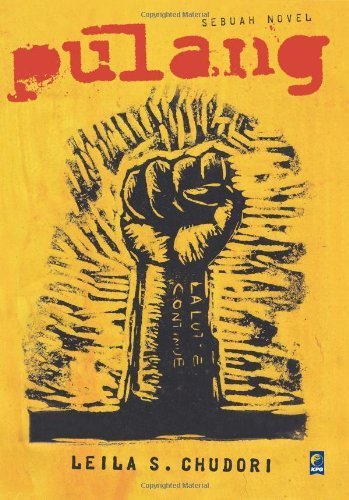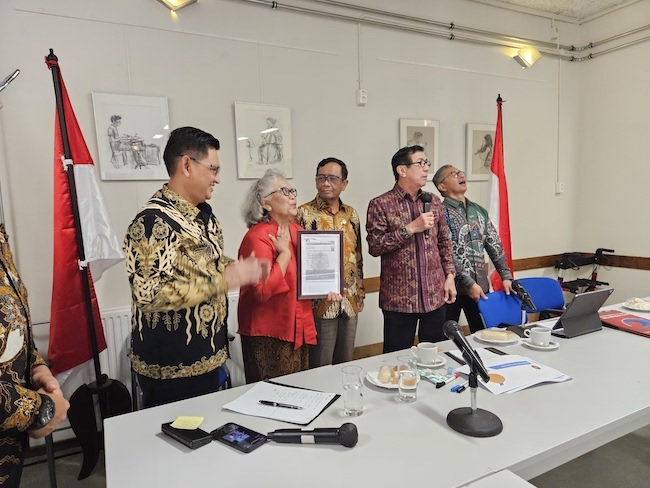Recent attempts to address the Indonesian genocide after 1 October 1966
Read Part 1 of this article
Since the PPHAM team presented its summary and recommendations in January 2023, the government has made several responses. At the time, President Jokowi acknowledged state responsibility for the 12 cases of crimes against humanity mentioned and expressed his regret. He did not make an apology, only expressing his sympathy to the victims. He pledged to provide restitution for direct victims and their families in a way that would not ‘negate the judicial solution,’ but did not specify the kind of solution he had in mind. Instead, Jokowi announced that the Coordinating Minister of Politics and Human Rights, Mahfud MD, would supervise this process of restoration of the rights of the victims. In response, Mahfud MD immediately announced that this would not mean that communism would be revived, and turned the focus to the restoration of the rights of exiles whose passports were revoked after 1965.
Jokowi’s initial acknowledgement of these historical cases of human rights violations and his further comments at Pidie in June 2023, were met with a sense of great relief by survivor groups including the exiles. They were no longer blamed for the violence they experienced and although there was not yet an apology from the president, he had expressed sympathy. After 57 years of silence about their plight, and after suffering the stigma of being associated with the Indonesian Communist Party (PKI) they welcomed the President’s words. In late August 2023, Mahfud MD, accompanied by the Minister of Human Rights Yasona Laoly and a large government delegation, visited The Netherlands and Prague to meet with exiles.
Exiles
Following Jokowi’s delegation of duties to him related to the PPHAM report, Mahfud MD’s first step was the restoration of the civil rights of the exiles. Perhaps he considered this would be a low-cost and non-controversial operation, both financially and politically. On 2 May 2023, the minister announced he would focus on restoring these rights and leave any judicial settlements to the Komnas HAM and lawmakers in the House of Representatives (DPR). He started by compiling a list of those political exiles willing to have their citizenship restored or who wanted to return to Indonesia. The foreign ministry was given the task of verifying the data. An initial list included 117 exiles, but the precise number of Indonesian political exiles living overseas remained unclear. Many had died, and others had adopted foreign nationalities and identities.
In a first reaction, two exiles Sri Ningsih and Tom Ilyas now living in Germany and Sweden respectively, declared that the government had to first explain to the public why so many Indonesians living and studying abroad in 1965, became stateless. Both had been studying abroad when their passports were confiscated. On 2 May 2023, Mahfud MD announced that 39 exiles were still living abroad due to the events of 1965. He noted that they resided in Russia, Czech Republic, and Croatia, among other places. Some, he noted, had already been invited to come back to Indonesia by presidents Abdurrahman Wahid and Megawati Sukarnoputri. Rather disingenuously he added that generally these exiles didn’t have a family in Indonesia anymore, nor did they have any property. This is of course, not surprising after the killing and looting carried out by the army and their auxiliaries during the purges of 1965-66.
How did Mahfud MD arrive at this number of 39 exiles? Other reports mention hundreds, even thousands of exiles, consisting of former students, diplomats, or those who attended congresses around 1 October 1965. In The Netherlands alone, far more than 39 exiles have been living there for many years. It appears that the minister acquired this list from the foreign ministry, who compiled it on the basis of reports from embassies about 39 students who were abroad on 1 October 1965 and alleged to be involved in some way with what took place in Jakarta that day. In 1966, the passports of these students were officially revoked by the embassies of the countries in which they were residing, acting on recommendations from the Persatuan Pelajar Indonesia (the Indonesian organisation for students outside of their country, PPI). By 1966 a split had occurred in PPI, which was at the time headed by a student in Hungary. One group insisted they were sent abroad by President Sukarno and stood by him. The other group followed the dictates of General Suharto. In a congress in Amsterdam in late 1966, the Suharto-oriented group denounced 39 of their compatriots. This is probably the origin of the list of persons Mahfud MD referred to on his visit to Europe in 2023.
The majority of exiles included those who were living abroad and lost their passports in the period between 1965-68. At that time, an Indonesian passport was only valid for three years. After 1 October 1965, those who needed their passports extended were obliged to sign a form swearing allegiance to Suharto. The passports of those who refused, were not extended. Many Indonesians probably didn’t even bother to come to their embassies. This group consisted not only of students, but also embassy staff loyal to Sukarno, or those were attending conferences at the time, including the celebrations of the anniversary of the Chinese Communist Party (CCP) on 2 October 1965. Many of them feared they would be arrested on their return, as indeed happened to some.

The poet Hadi S (for Sampang, Madura, where he was born) was chair of the leftist cultural organisation Lekra (The Institute of Peoples’ Culture) in East Java, and his wife, a leader of the progressive women’s organisation Gerwani (Gerakan Wanita Indonesia, Indonesian Women’s Movement). Upon their return home from Beijing in late 1965, the couple were arrested and never heard from again. How many people may have suffered a similar fate remains unknown. At the time, the exiles were widely dispersed, from Cuba to China, with many stuck in Eastern European countries. Later, many drifted to The Netherlands, but there are still sizeable communities of exiled Indonesians in other countries like Germany, Czech Republic, and France. Some exiles immediately rejected Jokowi’s and Mahfud MD’s attempts at reconciliation as an empty symbolic gesture.
Mahfud MD on tour
On 27 August 2023, a meeting was held in Amsterdam between a large delegation from Indonesia and a group of exiles living in The Netherlands and Germany. Exiles from France and Sweden also attended online. The delegation was led by Indonesia’s Coordinating Minister for Political, Legal and Security Affairs Mahfud MD, and Law and Human Rights Minister, Yasona Laoly. The Indonesian ambassador, Mr Mayerfas also attended. They were accompanied by a large staff, consisting of various directors of relevant government departments and their assistants. Mahfud MD explained that the proposal he carried with him was the utmost that was possible amid many constraints.
He re-stated the government’s preference for a non-judicial solution, claiming that as all perpetrators were already dead and many of the exiles had also already died, it would be better to start reconciliation now. The minister offered the exiles a temporary free multiple entry visa for five years, which could be extended. This was a welcome gesture and Mrs Sri Ningsih who lives in Germany, accepted her visa graciously.
But neither she nor the other exiles were satisfied. Two exiles spoke up, Mr Sungkono and Mrs Tatiana Lukman. They demanded truth-finding, and an apology from the president, not just an acknowledgement. Mrs Tatiana bitterly and aptly countered an earlier statement by Mahfud MD dismissing the notion of truth finding on the premise that nobody remembered anyway what had happened. ‘How could one forget that one’s father was murdered? That his grave was not known?,’ she asked. Mahfud MD countered that whoever wanted to investigate the history could do so, and he would provide financial assistance, but he did not see such a process as an obligation of the state. Adding, ‘And why would the state have to apologise? We have brought down the New Order, that state is gone, why would the present state have to apologise for what was done by a former state?’ The restrictions the victims face have all been lifted, he claimed.
In his exchange with exiles in the Netherlands, Coordinating Minister Mahfud MD denied the repression and discrimination victims of the 1965-66 genocide still face. His refusal to accept state responsibility for rewriting the history of the genocide and acknowledging the lies the New Order spread, which are still heard all over the archipelago, make one doubt the sincerity of the Indonesian government. Moreover, at the same time as emphatically denying that a judicial solution was closed off to victims, He also dismissed the possibility of bringing any perpetrator before a judge. He insisted that this was not a viable route as there was nobody alive anymore. This is of course not true. Many perpetrators are still alive, and over the years Komnas HAM has provided sufficient evidence to start a process of prosecution. The case of the slave labour camp on the island of Buru has been extensively documented, for example. In his meeting in Amsterdam, Mahfud MD admitted that religious and military figures were breathing down his neck on this issue.
Mahfud MD also dismissed the possibility that the decree on the prohibition of the teaching and spread of communism (MPRS 25/1966), could be lifted, citing procedural reasons. 'There is no MPRS anymore’, he stated, ‘so who can lift it?’ However, if President Abdulrahman Wahid suggested repealing the law, then surely President Jokowi can find a way to do so as well? The spectre of communism continues to linger in Indonesia. The latest revision of the Criminal Code, accepted by parliament in December 2022, contains Article 188 prohibiting the promotion of communism as against the state ideology of Pancasila, though the studying of Marxism is no longer a criminal offence.
The way forward
A second instalment of Jokowi’s attempt at reconciliation was launched at the Rumah Geudong in Pidie, Aceh on 27 June 2023. The president promised scholarships, opportunities for vocational training, money for house renovations and priority health care for victims. As some of these programs already exist, such as the provision of health care to victims and a program of agricultural assistance, the announcement can hardly be deemed progress. There was no indication of how many people would fall under the scheme, nor was there mention of a budget allocation. Jokowi said he hoped that the whole program could be implemented before the end of 2023. This seems highly unrealistic given that so far not even the most basic data about the number of victims and the crimes committed against them are available.
If President Jokowi is serious about reconciliation, apart from the necessity of truth-finding, ending the impunity of perpetrators, and rewriting the history books, the following steps may be taken. A National Human Rights museum should be established and the places where mass murders took place, or where prisoners were held and tortured should be memorialised. The mass graves should be opened, and families of victims should be assisted to identify their loved ones and supported in providing proper reburials for them. Presidential instructions should be issued on the above items before the current president’s term ends, so that his legacy can be preserved.
Saskia E Wieringa (sewieringa@xs4all.nl) is the chair of Gender and Women's Same-sex Relations Crossculturally, University of Amsterdam. She has published widely on sexual politics in Indonesia, women's empowerment and women's same-sex relations globally. Her books include the landmark Sexual Politics in Indonesia (Palgrave Macmillan, 2002) and Propaganda and the Genocide in Indonesia; Imagined Evil (with Nursyahbani Katjasungkana, Routledge, 2019). She is chair of the Foundation International People’s Tribunal (IPT) 1965.












